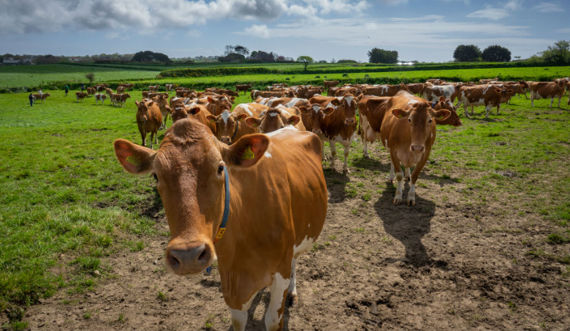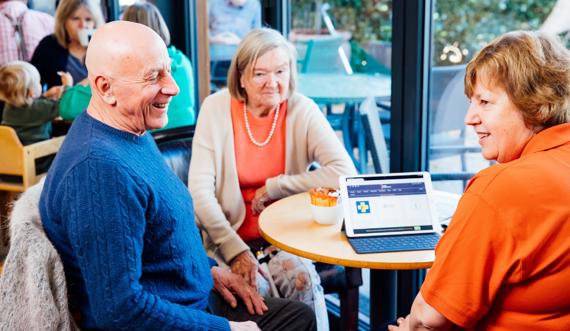Global Social Responsibility
About our global social responsibility
Concerns over the world we live in are gaining momentum and have been for some time.
With signs of global warming already showing its effects and countless socio-political causes coming to light, it's never been more important for all those in the developed world to do whatever they can to help.
We have always taken world environmental issues extremely seriously and have been playing our part for many years now.
Carrier bags
In 2008, we were the first retailer to introduce a 5p charge for the one-trip carrier bag, in an attempt to reduce the number of bags used. In 2018, we went one step further and removed all single-use shopping bags from our stores.
Reusable bags
We offer a number of reusable alternatives to the single-use bags.
- Bag for Life: this is a long-life reinforced plastic bag, designed to be re-used on multiple occasions. These are made of 100% recycled post-consumer waste and can be recycled at the end of their re-usable life.
- Teal shopper bag and wine carrier: a stronger and more environmentally friendly alternative to the bag for life, made of 80% recycled post-consumer waste.
- Foldable shopper bag: these bags can fold up into a pocket or handbag and are perfect for customers on the go.
Jute eco friendly carrier bags
Jute carrier bags provide a long life, natural fibre alternative.
These ethically sourced bags are produced:
- under safe working conditions
- with ethnic and religious tolerance
- with no child, forced or bond labour
- with worker unions respected
- using responsible waste management
- with "Zero Carbon"; offsetting the carbon emission from the producers by planting trees in heritage forests under the auspices of the Woodland Trust
Find out more about how we're tackling single-use plastics.
Recycling
We recycle cardboard and high grade polythene from all our retail outlets, and we also recycle waste office paper.
Recycling bins
We back community recycling programs by providing collection points at our Grand Marché stores in St Peter, Jersey and St Martin, Guernsey.
We currently collect aluminium cans and old clothes at St Peter and glass, aluminium and high-grade paper at St Martin.
All Grand Marchés also offer battery disposal points.
Telecom directories
We provide annual collection facilities for out-of-date telecom directories at Grand Marché St Helier.
Environment
Electric vehicle charging points
We have introduced electric vehicle charging points at our Grand Marché St Peter store in Jersey, and will be rolling these out to other stores.
Lighting
We have undertaken a programme of replacing all our premises' conventional light bulbs with low energy long life lamps, which have provided a significant saving in energy use and will reduce replacements.
Emission reductions to date are averaging around 15%.
Main voltage optimisation
This is something that is relatively new, and is based around a system that actually controls the amount of energy coming into a premise.
This has a number of direct benefits; firstly it actually reduces the amount of energy used, and secondly it prolongs the life of electrical equipment.
Energy savings will be up to 14%.
Renewable energy
Renewable energy is a key part of our carbon reduction policy going forward.
We have already installed photovoltaic panels (solar panels) at one of our developments, and we are trialling "Sunpipes" which is a system that collects natural light via a lens which in turn reflects the light via a polished aluminium tube to wherever the light is needed.
Heat pumps and heat recovery
We use advanced heat which reuses heat produced by refrigeration units for heating and hot water.
Building controls
All new buildings are installed with a control system to monitor temperature, electrical equipment and lighting to optimise the energy used.
Food miles
We love local food, so by buying locally produced products, we all help to save the costs associated to bring goods into the islands.
We actively seek out any local producer that can supply products to our stores, and reduce the energy cost of shipping it to the islands.
Find out more about our local suppliers.
We're committed to support the Universal Declaration of Human Rights and improve conditions in our supply chains.
In line with this, we continue to promote Fairtrade and develop long term, sustainable relationships and offer the widest range and availability of Fairtrade products possible.
We hope to support developing countries living wage standard, trades union recognition (where lawful), removal of child labour, and introduction of reasonable working hours and overtime.
Animal welfare
We are against the unnecessary suffering of animals and animal testing of cosmetic and household products and ingredients in particular.
Where safety testing is needed, we believe alternative methods of testing should be used.
To avoid further testing on animals, products and ingredients with a history of safe use should be chosen.
Food
Most consumers are concerned about the safety of the food they eat.
We accept that human safety must be of prime importance and that the testing programmes required to ascertain this safety for ingredients and additives are dictated by regulatory bodies, and therefore are outside our control.
However, we do seek to minimise the use of additives (which are responsible for much of this testing) in Co-operative brand food products where practical.
The safety of our finished products can be established by other techniques and we do not, therefore, conduct, commission, or expect our suppliers to commission safety tests on animals for this purpose.
Non-food
We have worked with the British Union for the Abolition of Vivisection (BUAV), firstly in applying their Humane Cosmetics Standard for cruelty-free products to Co-operative brand toiletry products, and secondly, in the development and application of a similar Humane Household Standard for household products.
As a result, we have had for many years, one of the most stringent non-animal testing policies of all grocery retailers covering its non-food (toiletry and household cleaning) products.
We operate a fixed cut-off date (ie a date beyond which The Co-operative and its suppliers must not have conducted or commissioned animal testing on any product or ingredient) of 1985 for toiletries and 1997 for household products.
Most other retailers operate using later or rolling dates, which means that they can only state that their products have not been tested in the last 5 years.
Pet food
As with food products, we don't believe it's necessary to carry out invasive tests on animals to evaluate pet foods, nor to conduct preference and palatability testing on captive animals.
We believe this can be achieved satisfactorily with domestic pets under the supervision of the owner, and so Co-operative brand pet foods are only tested in this way.





